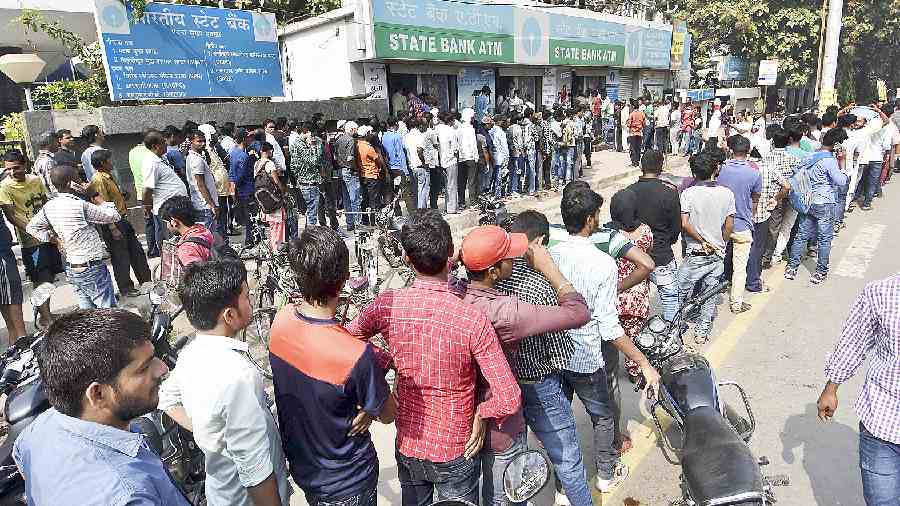The action of demonetisation of Rs 1,000 and Rs 500 notes was “vitiated” and the notification issued for this in November 2016 was “unlawful”, Justice B.V. Nagarathna of the Supreme Court said in her dissenting verdict on Monday.
Parliament cannot be “left aloof” in a matter of such importance and its views on demonetisation were critical, Justice Nagarathna said.
There was no independent application of mind by the Reserve Bank of India (RBI) and the entire exercise was carried out in 24 hours, she further said.
The Supreme Court, in a 4:1 majority verdict, has upheld the 2016 move and said the decision-making process was not flawed merely because the procedure emanated from the government.
In her 124-page separate verdict, Justice Nagarathna said at the outset that she wished to differ on the reasoning and conclusions arrived at in the majority judgment on the exercise of power by the Centre under sub-section (2) of Section 26 of the Reserve Bank of India Act, 1934, in the issuance of the November 8, 2016 notification.
What ought to have been done through a parliamentary enactment or plenary legislation could not have been carried out by simply issuing a notification by the Centre, she said.
“In view of the aforesaid conclusions, I am of the considered view that the impugned notification dated November 8, 2016, issued under sub-section (2) of Section 26 of the Act is unlawful. In the circumstances, the action of demonetisation of all currency notes of Rs 500 and Rs 1,000 is vitiated,” Justice Nagarathna said.
Parliament, the fulcrum in our democratic system of governance, must be taken into confidence because it is the representative of the people of the country, she said.
“It is the pivot of any democratic country and in it rest the interests of the citizens of the country. The Parliament enables its citizens to participate in the decision-making process of the government. A Parliament is often referred to as a ‘nation in miniature’; it is the basis for democracy,” the judge added.
Justice Nagarathna observed that Parliament provides representation to the people of a country and makes their voices heard.
“Without a Parliament, a democracy cannot thrive; every democratic country needs a Parliament for the smooth conduct of its governance and to give meaning to democracy in the true sense. The Parliament which is at the centre of our democracy cannot be left aloof in a matter of such importance. Its views on the subject of demonetisation are critical and of utmost importance,” the judge said.
A comparative reading of records submitted by the Centre and the RBI makes it crystal clear that the process of demonetisation of bank notes of Rs 500 and Rs 1,000 commenced or originated from the Union government, she said.
“The said fact is crystalised in the communication addressed by the Secretary, Department of Economic Affairs, Ministry of Finance, dated November 7, 2016, to the Governor of the Bank,” Justice Nagarathna said.
“The phrases and words emphasised hereinabove clearly indicate that the proposal for demonetisation was from the Central government. In substance, the Central government sought the opinion/advice of the Bank on such proposal.”
The words or phrases used — “as desired” by the Centre; government had “recommended” the withdrawal of legal tender of existing Rs 500 and Rs 1,000 notes; recommendation has been “obtained” — are self-explanatory, the judge said.
“This demonstrates that there was no independent application of mind by the Bank. Neither was there any time for the Bank to apply its mind to such a serious issue,” Justice Nagarathna said.
“This observation is being made having regard to the fact that the entire exercise of demonetisation of all series of bank notes of Rs 500 and Rs 1,000 was carried out in 24 hours,” she said.
Sub-section (2) of Section 26 of the Act applies only when a proposal for demonetisation is initiated by the Central Board of the Bank by way of a recommendation being made to the Union government.
Justice Nagarathna said the action of demonetisation initiated by the Centre by issuance of the notification was an exercise of power “contrary to law” and therefore unlawful and consequently, the 2016 Ordinance and 2017 Act are also unlawful.
“But, having regard to the fact that the demonetisation process was given effect to from November 8, 2016 onwards, the status quo ante cannot be restored at this point of time,” she said.
Justice Nagarathna said when the Centre proposes demonetisation of any bank note, it must seek the opinion of the Central Board of the Bank.
“The opinion of the Central Board of the Bank ought to be an independent and frank opinion after a meaningful discussion by the Central Board of the Bank which ought to be given its due weightage having regard to the ramifications it may have on the Indian economy and the citizens of India although it may not be binding on the Central government,” she said.
Demonetisation was an initiative of the Centre, targeted to address “disparate evils”, including “black” money and counterfeiting, and was well-intentioned, she said.
The objective of the Centre may have been sound, just and proper, but the manner in which the objectives were achieved and the procedure followed for the same, “in my view, was not in accordance with law having regard to the interpretation given above”.
“It has also been brought on record that around 98 per cent of the value of the demonetised currency have been exchanged for bank notes which continues to be legal tender. Also, a new series of bank notes of Rs 2,000 was released by the Bank. This would suggest that the measure itself may not have proved to be as effective as it was hoped to be,” Justice Nagarathna noted.












